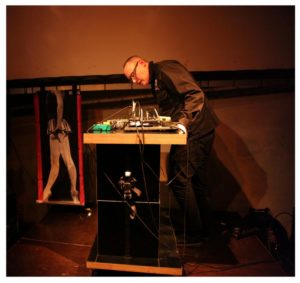“With Death Squad it was pointing a loaded gun at the audience and… taking the audience hostage.”
That’s Michael Nine, who performs noise under the name MK9 and previously as Death Squad, talking about some of his more memorable performances. MK9 is one of 18 artists from across North America performing at Dry Socket, a music festival featuring a litany of noise acts. Although the genre is unconventional, its fans acquire an immense sense of satisfaction from it.
“There’s sort of an intensity,” says Dry Socket founder Ron Brogden. “As soon as you get away from worrying much about songwriting in the pop-music sense, the further away from that, the closer you get to the visceral side of sound. With something like The Rita, just the impact that has is the closest, for me anyway, that you’re ever going to get to the first time you saw a punk rock band. Obviously now, punk rock’s been around a long time, but the first time you see something that you’ve never seen before, that totally speaks to you and has an impact; noise is able to maintain that to a certain extent.”
Dry Socket will host many accomplished musicians; however, headliner The Rita stands out with his extremely experimental and creative process for conjuring harsh noise. Sam McKinlay, the solo artist behind The Rita, has been into creating harsh noise for years, from using dirt bikes in art galleries to making noise with ballerinas.
“From, like, the mid-’90s on, I kind of just made it my own,” says McKinlay. “I just got more and more into the analogue effects and the custom fuzz pedals. Lately, I work with ballet dancers a lot. So I’ll have them rigged up to a microphone; then, as they move, it translates into that exact same sound—like, rigged up to their thighs and the arches of their feet and the floor that they’re on, and as they move, it virtually, eventually, just creates that same sound I achieved in the art gallery with the dirt bike. So again, it’s just translating various obsessions and interests into a sound I absolutely love. And then in a live environment, it’s a really crushing, high-volume experience.”
Although to an outsider noise seems to be about being the most extreme, it’s like any art. At its core, it’s a labour of love, a medium for expression and the shared, arduous experience of being a human being.
“When I first started doing it, I was listening to some stuff, and really enjoyed the sounds and just wanted to kind of make my own sounds,” says Nine. “I’ve always been searching for specific frequencies, so when I was first doing stuff in ’90 and ’91, I never thought of releasing anything, never thought of performing. It sounds cliché, [but it was] like personal therapy. Like the frequencies, if I could manipulate whatever I was using to make sounds that would affect my brain and alleviate stress or depression or anything, that’s what the whole beginning of it was.”
The genre of noise is broad and doesn’t discriminate against new ideas and experimental interpretations, making it an incredibly versatile and ever-expanding model for music. However, even with its incredibly experimental nature, it still has feeling.
“I think if someone’s doing something that’s honest, and from their heart and their soul, giving everything that they have,” says Nine, “I think that’s what makes some of the best stuff.”
All of which begs the question: can workers on a construction site accidentally make a great noise record?
“There’s some famous—well, infamous—early Japanese noise acts like Hatanarash; [one of] their gig[s] involved using a backhoe to tear down the gallery they were in,” says Brogden. “So definitely I expect—I can’t say this 100 percent for sure—people have gone and recorded construction sites to be able to use those sounds. You know, I’d listen to it. And I do—if I’m walking downtown, and they’ve got the piledriver going and something whirring in the back, you’ll see me standing there smiling.”
Dry Sockets
7 pm Friday, March 8 and Saturday, March 9
$20, Intrepid Theatre
industrial.org

